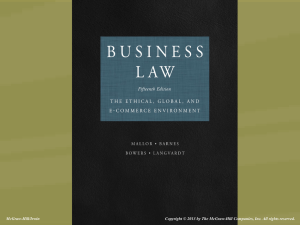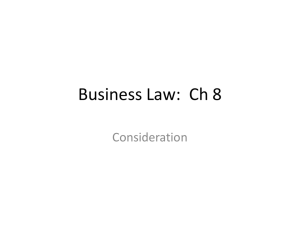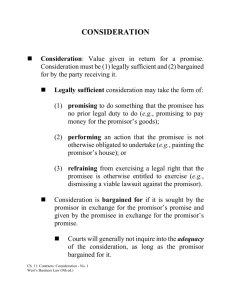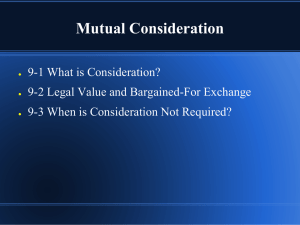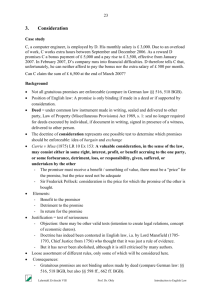Consideration
advertisement
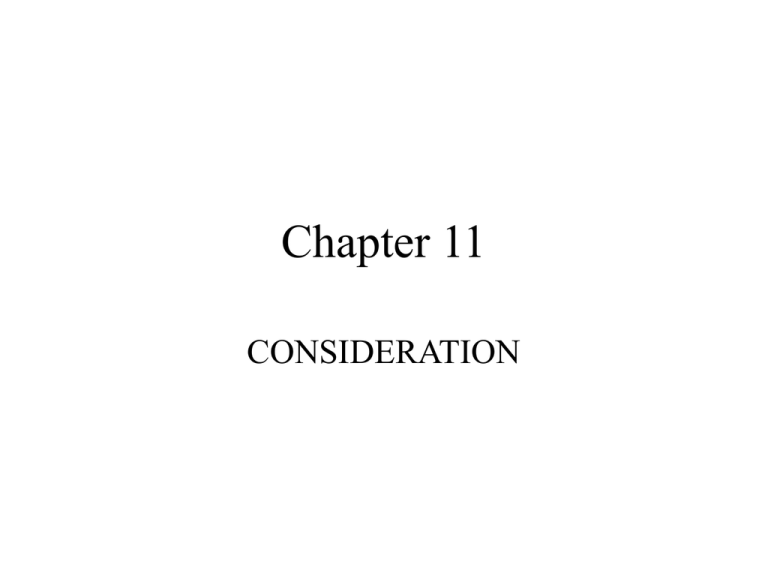
Chapter 11 CONSIDERATION Consideration - Definition • A basic requirement of a contract is legally sufficient consideration • A promise unsupported by consideration can not be enforced. • Consideration is something of value: it must be legally sufficient (either the promisor incurs some beneftit OR the promisee incurs a detriment) & there must be a bargained-for exchange Legal Detriment • By legal detriment, we mean creating, modifying, or giving up a legal right, which is not the same as an economic, or actual detriment. • Example - Andy promises to pay Bill $15 if he delivers a book to Carl. Andy’s promise is binding because Bill incurred a legal detriment by delivering the book to Carl, as Bill was under no prior obligation to do so. Andy and Bill have bargained for this transaction. Gratuitous Promises - Gift Promises • Purely social or gratuitous gift promises are not legally enforceable • To change a gift promise into a legally enforceable promise, the promisee must do something in exchange. (Mrs. Colby’s promise to give her niece $10,000 is unenforceable UNLESS niece does something in exchange, i.e, get straight A’s) • EXCEPTION:, Promissory Estoppel (Jim pledges to donate 10 million to university. The university begins construction. Jim can’t retract pledge.) Illusory Promises • A contract that provides the parties only have to perform if they “choose” to. The parties can choose not to perform their contractual obligations. • Illusory promises are without consideration and are unenforceable – “All I wish” or “All I desire” is illusory • BUT, output and requirement contracts are NOT illusory (“All I need”, “All I require”, All I produce”). They are enforceable. Pre-Existing Duty Rule • A promise to do what one already has a legal duty to do does not constitute legally sufficient consideration (police catch thief) • The pre-existing duty rule is designed to prevent extortion & a hold-up of contracts. • EXCEPTIONS – Unforeseen difficulties; the contract can be modified. – Good faith oral modification of a contract for the sale of goods. Past Consideration • Promises made after the promisee has already done something, are unenforceable (i.e., Tom’s promise to pay Cindy $ 25 after Cindy has already found his wallet, is legally unenforceable) • Remember, consideration must be a bargained-for exchange; Consideration is required to support a promise and to induce performance (which you can’t have for an act already performed) • Exception - Promises made after past acts rendering emergency services may be enforced. Liquidated and Unliquidated Debts • Unliquidated debts - Amount of debt is genuinely disputed. These debts may be COMPROMISED by the payment of a smaller amount due under an existing obligation, called an accord and satisfaction ($100,000 computer system does not work as promised. To settle the dispute the parties agree that $700,000 will be paid in full and final payment for the system; X writes “payment in full” on back of check). • Liquidated debts - Debts that are undisputed, due and certain, may not be compromised. Partial payment of liquidated debts are NOT consideration for a promise by the creditor to accept a lesser amount (because the debtor has a pre-existing duty to pay). But,a smaller payment can be made if there was new consideration OR the agreement to pay the smaller sum was made before the debt actually became due.




